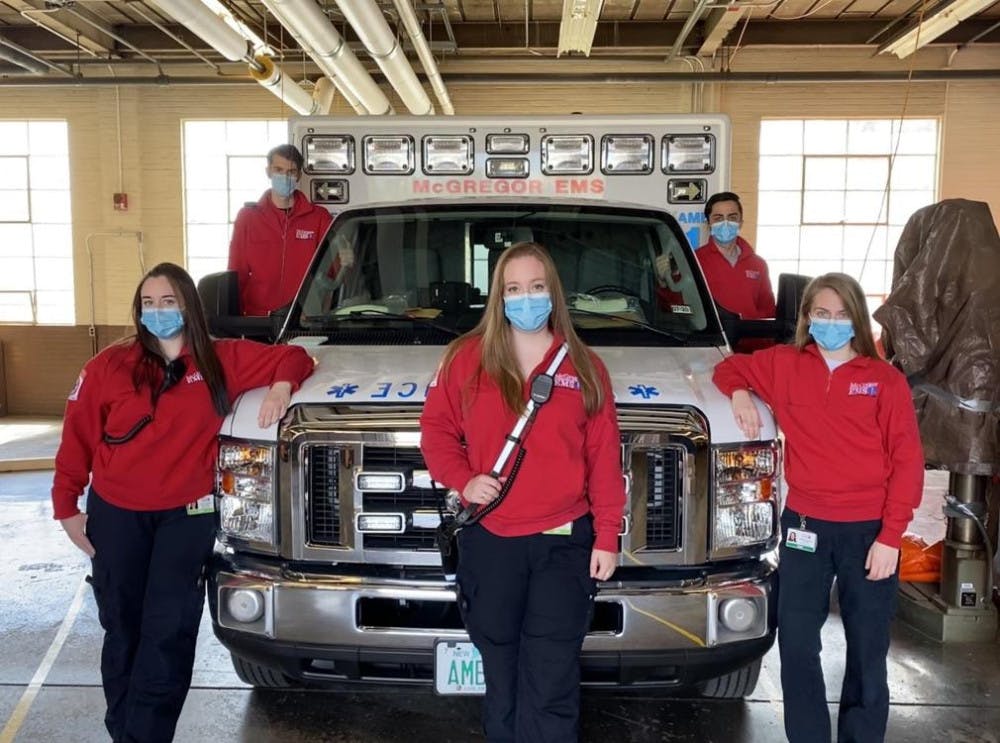McGregor Memorial Emergency Medical Services (EMS), the primary emergency ambulance service for Durham, Lee, Madbury, and the University of New Hampshire (UNH), has begun having able and willing volunteers stay on or near campus to help fill shifts during the coronavirus (COVID-19) pandemic.
McGregor is a primarily volunteer organization, and many of its EMTs are UNH students. According to Tyler Silverwood, attendant EMT and sophomore biochemistry major, during other periods of time when students are not on campus, such as the summer, volunteer hours decline and coverage is not consistent. “The initial concern was that the same would hold true during this pandemic,” Silverwood said, “when most students have moved away and the community would need us the most.”
To combat this, McGregor told its volunteers that if they were able, they would be allowed to come back and live on campus. Silverwood said, “Everyone who still lives close enough, or who has moved [on campus], has really stepped up and kept us fully staffed…we have even been able to consistently fill a third ambulance when needed.”
Silverwood called his decision to stay with McGregor a “no-brainer.” He said, “With the PPE [personal protective equipment] and training they provided, I felt safer going on a confirmed COVID-19 call than I did stopping for coffee or gas.” He said he was more concerned with contracting COVID-19 and then transporting it between work and home, so “the second that we were offered housing in Durham, I let them know that I was interested.”
Ayla Wamser, another attendant EMT and a senior biomedical science major, said, “I am fortunate enough to be in a position to help people in this time of need. I would never turn my back on our community, certainly not when they need us the most.”
Maria McMillan, an EMT and crew chief for McGregor and a junior clinical psychology and public health major, said “There wasn’t a whole lot of decision making involved for me…know I had the skills and training to keep giving back to the community, I couldn’t stay away.”
According to McMillan, UNH has offered on-campus housing in Eaton House and meal plans to the student volunteers, allowing those without residence nearby to stay close “without having to commute and put our families and loved ones at risk.”
Silverwood said that the accommodations are providing them with “almost everything we need,” adding that Stillings, the only campus dining hall still open, has been giving the volunteers free meals. “It’s take-out only, and we wear masks when we’re inside,” he said. “We still occasionally go out to eat at the Big Bean or Hop & Grind, or take advantage of the free coffee offered by AJ’s.”
Wamser, one of the volunteers who lives nearby already and as such is not living in Eaton House, said, “UNH has been wonderful in allowing McGregor personnel a place to live on campus. As a UNH student, Durham resident, and EMT, the community has been fantastic in its support.”
But the EMTs said that life on campus was far from normal. Silverwood said, “It’s exactly like you think walking around the empty streets of Boston or NYC would feel right now - there’s almost no one around and most of the buildings are closed and their lights turned off…One of the strangest parts is seeing the rec center completely walled off, with all the beds inside, just waiting for patients.”
“It’s an eerie feeling to see the campus so silent,” Wamser said. “Even in the summers or on school breaks, you still have the quiet buzzing of students around campus.”
“Quite honestly, it’s surreal,” McMillan said of the empty campus. “Apocalyptic, almost.”
McGregor, according to Silverwood, McMillan, and Wamser, has adapted very well to pandemic conditions. “Since the start of the…outbreak in China, McGregor has been closely monitoring the pandemic,” Wamser said. “All personnel have been provided training on proper PPE usage and managing COVID calls.”
McGregor volunteers now have CAPRs, helmets with air-purifying respirators, in case of suspected COVID calls. On all other calls, they wear surgical masks and face shields, just in case, and ask that patients wear masks as well. “We are lucky to have a sufficient supply of PPE,” Wamser said. “The community has been incredibly gracious in donating items such as scrubs, hand sanitizer, and homemade masks.”
Silverwood added that McGregor has “more than enough PPE to stay safe during the pandemic,” saying that their PPE availability and training might be “among the best in the country.”
The volunteers are also making adjustments for staying safe even when not on calls, wearing surgical masks in the station and maintaining a distance of six feet. To help the EMTs with social distancing and minimize their risks, they have temporarily moved to Putnam Hall on campus, which is “much larger” than their normal station on College Road, according to Silverwood.
Notwithstanding the pandemic, the workload of McGregor EMTs has not substantially increased, according to Silverwood. “Surprisingly, our call volume has been relatively low,” he said. “Many people don’t want to go to the hospital. This makes sense for minor injuries, but our concern is that people are staying home with heart attack or stroke symptoms, and not calling 911.”
Despite this, McGregor EMTs are keeping the station “fully staffed,” according to Silverwood. “I think we actually set the record for most volunteer hours ever in March, and we expect to beat that record again this month.”
Wamser said, “I hope the community can feel comforted by the fact that McGregor will continue to provide the same high-quality service that they always have.”
“Everyone at McGregor shares a passion for giving back to the communities that give us so much,” McMillan said. “We have received an overwhelming outpouring of love and support from the university and surrounding communities, and it makes the work that we are doing that much more rewarding.”














